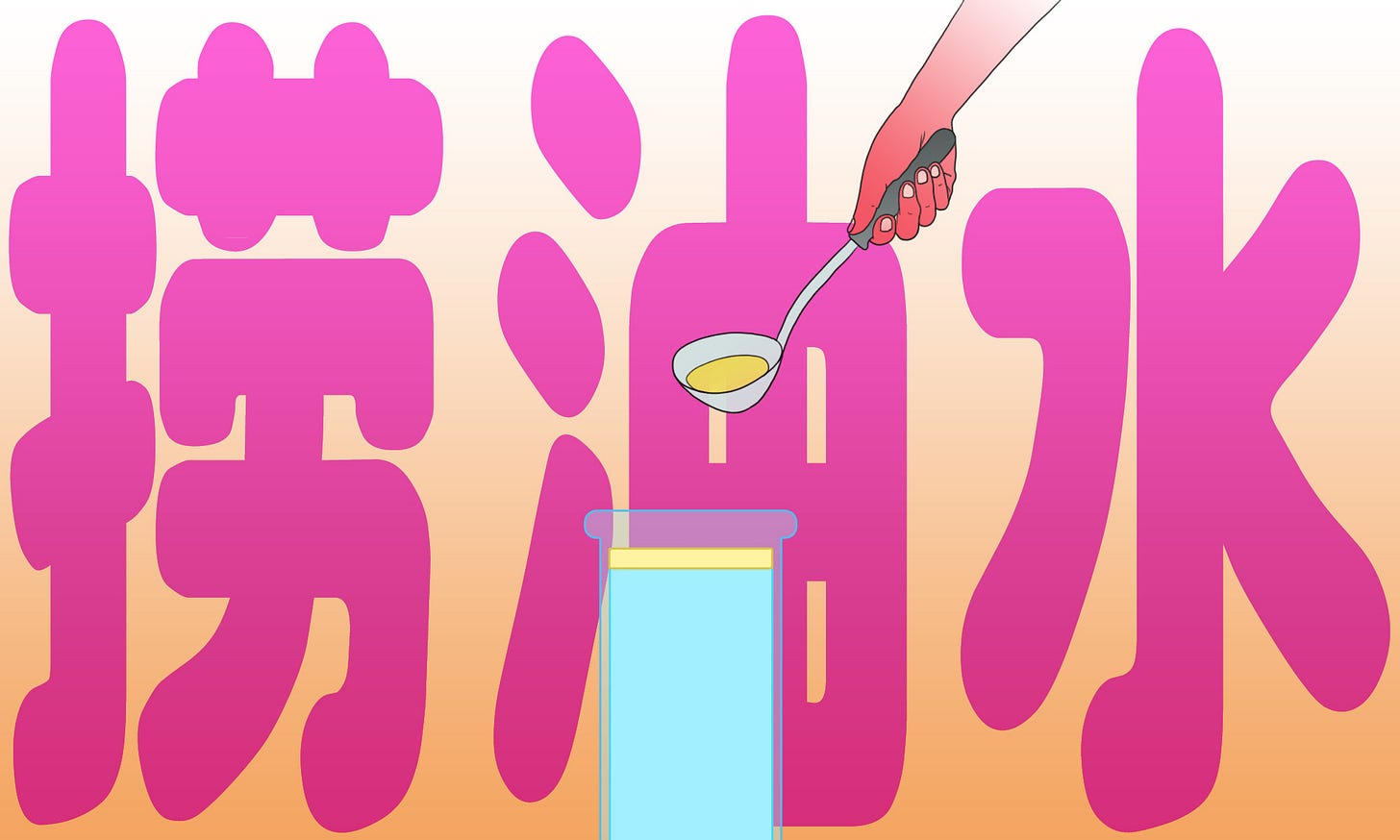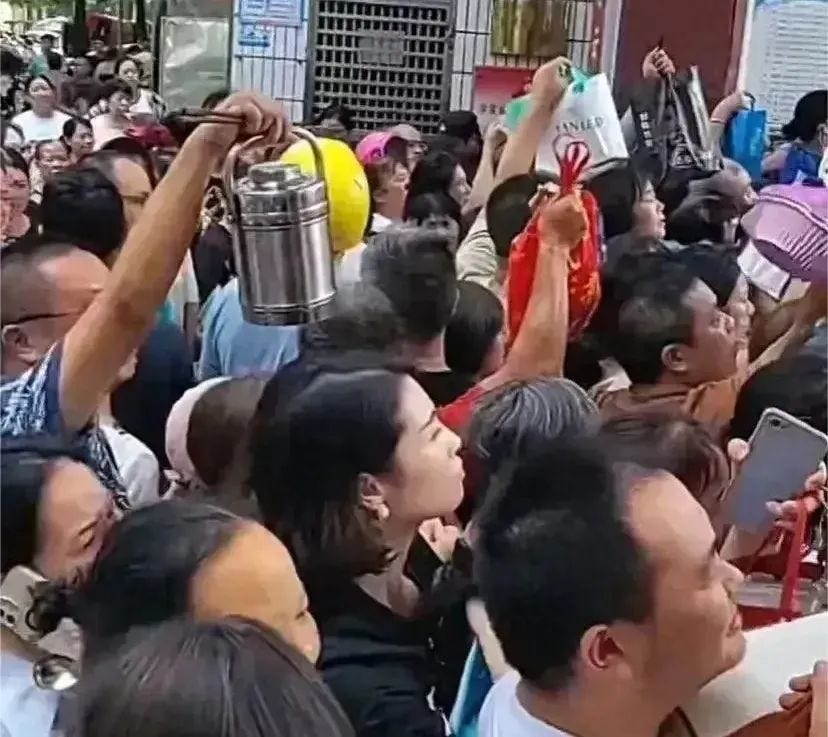Welcome to RealTime Mandarin—a multimedia resource to immerse you in the latest Chinese language trends, inspire you to practice and improve your Mandarin every week, and empower you to communicate with confidence.
Subscribe now to get the next issue straight to your inbox!
Students at schools across China have been seen gathering outside campuses at lunchtimes, waiting for homemade meals to be delivered by parents or relatives.
A controversial move to serve ready meals (预制菜 yùzhì cài) at schools, instead of freshly cooked dishes, is the cause:
The topic of “ready meals coming on to campus” has generated a lot of public discussion recently. Primary and secondary schools as well as kindergartens in many places have adopted a catering model, whereby food is cooked in a central kitchen. Many parents are worried that it also means serving ready meals, and question whether such food should be given to their children.
“预制菜进校园”的话题最近引发了大量公众讨论。多地的中小学、幼儿园采用中央厨房配餐模式,不少家长担忧其中包含预制菜,继而质疑这样的食材是否应该给孩子吃。 [3]
Ready meals are an emerging sector, which means it is still relatively unregulated, leading to recent controversies and greater scrutiny.
It's also a big business opportunity, and some companies have already moved to capitalise on it.
In 2022, the scale of China's ready meal market reached 419.6 billion yuan, and it is expected to exceed one trillion yuan by 2026. Prepared dishes are making their way to more and more people’s dining tables. [2]
2022年,中国预制菜市场规模,已经达到4196亿元,预计2026年,将超过万亿。 预制菜正在进入越来越多人的饭桌。 [2]
The regulations are vague, so some companies are cutting corners, making a quick profit at the expense of consumer safety:
With the news that the government will prioritise development of ready meals, but with industry standards not established, it’s not hard to imagine that there will be plenty of opportunities to take advantage of loopholes and make a quick profit.
随着国家将把预制菜纳入重要的发展方向的消息传出,相关的行业标准却还没建立起来时,钻空子捞油水的契机也就随之涌入
The story brings together two highly emotive topics in China: Food safety and education, as the comment of one parent on social media highlights:
"I don't want a second or a third child. I just have one son. Whoever messes with him is messing with me!"
“我不要二胎三胎,我就一个儿子,谁弄我儿子我弄谁!”[2]
It also ties together a number of stories we have learned about in this newsletter in recent months. Such as the food safety scandal in a Jiangxi College:
I believe that if we remain silent, today they will dare to feed our children stale vegetables, tomorrow they will dare to use expired and smelly food, and the day after tomorrow they will dare to "call a rat a duck".
我始终认为,如果我们保持沉默,今天,他们敢用发黄的菜叶给孩子们吃,明天,就敢用过期发臭的,后天,他们就敢指鼠为鸭。 [2]
So, how will this latest food safety scandal unfold?
Favourite Five
1. 捞油水 lāo yóu shuǐ
ill-gotten gains from a loophole
但随着国家将把预制菜纳入重要的发展方向的消息传出,相关的行业标准却还没建立起来时,钻空子捞油水的契机也就随之涌入 - But with the news that the government will prioritise development of ready meals, while industry standards are not yet established, it’s not hard to imagine that there will be plenty of opportunities to take advantage of loopholes and make a quick profit. [1]
Note: See this week’s China Project Phrase of the Week for more.
2. 触到逆鳞 chù dào nì lín
touch the inverted scale of a dragon; cross sb’s red line
最近,无数家长被触到了逆鳞 - Recently, an issue has touched a raw nerve of countless parents. [2]
Note: According to legend, 逆鳞 nì lín is the “inverted scale of a dragon”. If someone touches it, the dragon will kill them. It’s from the longer phrase: 龙有逆鳞,触之必怒.
3. 细思极恐 xì sī jí kǒng
terrifying upon closer examination
这种企业都能与学校合作,细思极恐 - It gets more and more terrifying as you think about how these kinds of businesses can collaborate with schools. [2]
Note: An internet slang phrase.
4. 指鼠为鸭 zhǐ shǔ wéi yā
call a rat a duck
后天,他们就敢指鼠为鸭 - The day after tomorrow, they will dare to misidentify a rat as a duck. [2]
Note: A neologism invented this year following another food safety scandal in June, when a student at a college found a rat head in his meal. The school insisted it was a duck’s head. We discussed this story here.
5. 科技与狠活 kē jì yǔ hěn huó
Hex Technology; additives in food
大众担心得最多的,就是“科技与狠活” - What worries the public the most is the additives in food. [2]
Note: A new word created out of a food scandal earlier this year when soy sauce brand Haitian was found to have a different recipe, full of preservatives, for its products in China, whereas products in Japan had none.
Related:
元素周期表 yuán sù zhōu qí biǎo - the Periodic Table, a new slang term meaning “full of chemicals and preservatives”. Zoe explains more in the member podcast.
Consuming the Conversation
Useful Words
6. 烹饪 pēng rèn
culinary arts
中华民族引以为豪的烹饪技艺从此不再重视 - The culinary arts, which the Chinese nation has always been proud of, are no longer valued. [1]
7. 锅气 guō qì
taste of a wok
谨记,锅气如今也可以用香精制造了 - Remember, even the taste of a wok can now be reproduced using flavorings. [1]
Note: Also described as the the Chinese umami.
8. 嘴叼 zuǐ diāo
discerning palate, picky about taste
可能是我嘴叼,但预制菜那千篇一律的味道真的一吃就吃出来 - Maybe I have a discerning palate, but I can really tell the bland flavour of ready meals as soon as I take a bite. [1]
Note: This has negative connotations.
9. 品控 pǐn kòng
quality control
归根到底,品控才是中央厨房预制菜最核心环节 - In the end, quality control is the most crucial aspect of ready meals produced in a central kitchen. [1]
10. 口感 kǒu gǎn
'mouth feeling'; texture and flavour
其次,是饭菜口感很差 - Secondly, the texture and flavor of the food are very poor. [2]
11. 激素 jī sù
hormones
但谁愿意自己的孩子从小吃着添加剂、激素长大 - But who is willing to let their children grow up consuming additives and hormones from a young age? [2]
Three-character phrases
12. 摇钱树 yáo qián shù
money tree
别让孩子变成某些人的摇钱树 - Don't let your children become someone's money tree. [2]
Note: Same imagery as in English
13. 出岔子 chū chà zi
go wrong or have a problem















